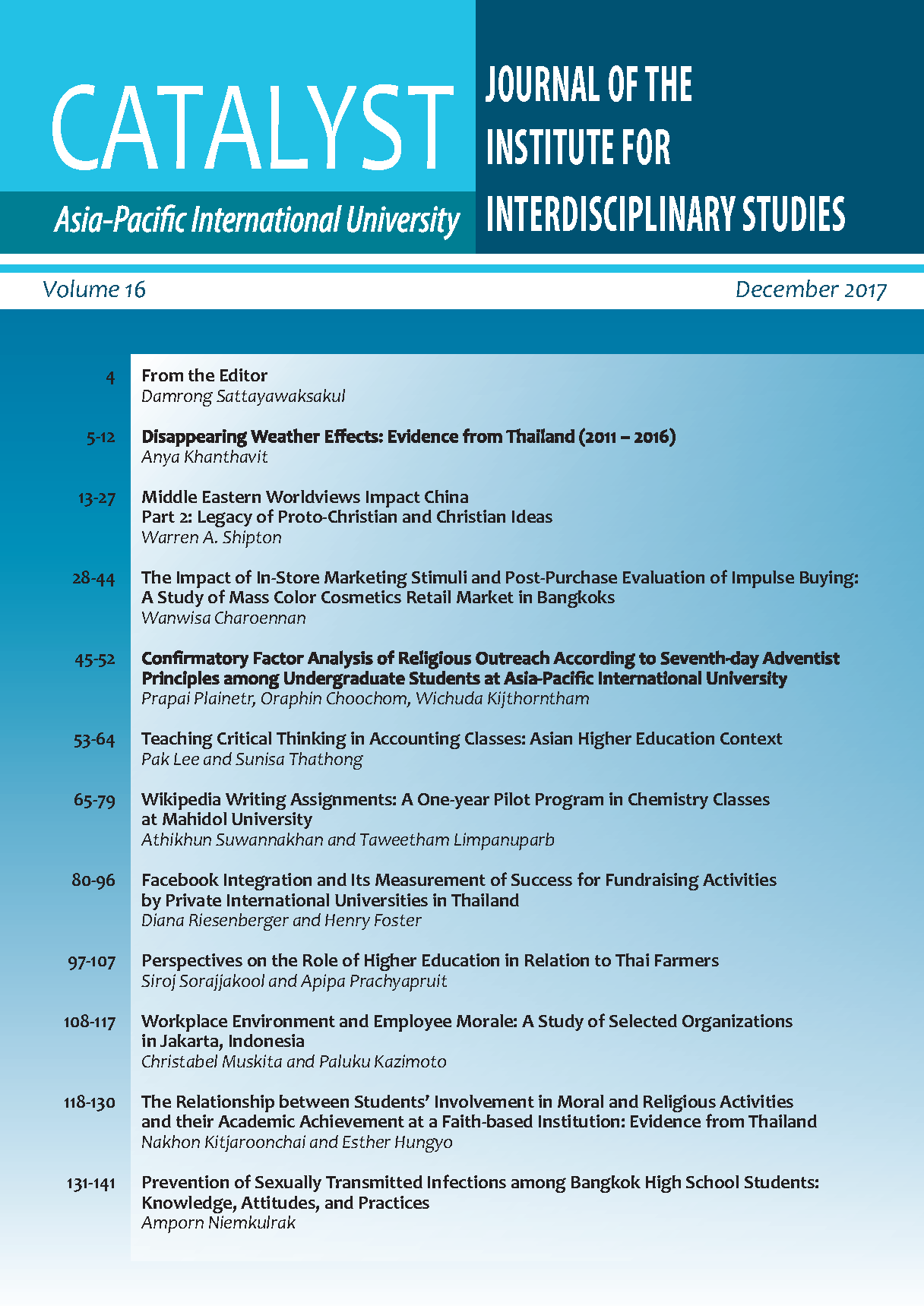Perspectives on the Role of Higher Education in Relation to Thai Farmers
Main Article Content
Abstract
While Thai higher education has sought to facilitate social mobility for local Thai farmers who are among the poorest in the country, the socio-economic status of farmers seems to be in decline. This study explores the perspectives of scholars and notable farmers in regards to the role of higher education within the context of Thai farmers seeking qualitative data to answer the question “What has higher education done to enhance life quality for local farmers?” Eight participants were interviewed for this qualitative study. Two participants are notable farmers, one is a local activist in northern Thailand, and the rest are academics researching in this field. Two themes emerged from these interviews:
1. There is a lack of attempts to understand lived experiences of local farmers by institutions of higher learning; and
2. Thai higher education has been dominated primarily by Western ideology/modernity which further complicates the lives of local farmers
Article Details

This work is licensed under a Creative Commons Attribution-NonCommercial-NoDerivatives 4.0 International License.
Copyright: Asia-Pacific International University reserve exclusive rights to publish, reproduce and distribute the manuscript and all contents therein.
References
Baker, C., & Phongpaichit, P. (2009). A history of Thailand. Oxford: Oxford University Press.
Charmaz, K. (2006). Constructing grounded theory: A practical guide through qualitative analysis. London: Sage.
Frier, P. (2003). Pedagogy of the oppressed. In A. Darder, M. Baltodano & R. Torres (Eds.), The critical pedagogy reader (pp. 57-68). London: Routledge Falmer.
Haveman, R., & Smeeding, T. (2006). The role of higher education in social mobility. The Future of Children, 16(2), 125-150.
Hirsch, P. (2011). Afterward: Re-agarianisation or repositioning agrarian relations? In C. Vaddhanaphuti and Chusak Wittayapak (Eds). Revisiting agrarian transformations in the greater Mekong sub-region: New challenges (pp. 185-188). Chiang Mai: Regional Center for Social Science and Sustainable Development, Chiang Mai University.
Jaitieng, T. (2003). Mu ban chaonaphatiwat bon pan din Isan ton bon (Revolution of Northern Isan farmers' communities). Bangkok: Sangsan.
Lao-an, T. (2010). Economic changes of the "Peasant Society" in Isan region, from 1957-2007: A case study of Kugasing village, Roi Et province. (Master's Thesis), Chiang Mai University, Chiang Mai.
Liemcharoen, W. (2011). Pahiroop kasetagam peua kwammunkong tang aharn: Bod wikroa lae patibutkarn tang nayobai (Agricultural reform for food security: An analysis and applications of policies). Nonthaburi: BioThai Foundation.
Nartsupha, C. (1999). The Thai village economy in the past (C. Baker and P. Phongpaichit, Trans.). Chiangmai: Silkworm Books.
Nartsupha, C. (2014). Gaan pen samaimai gub naew kid chum chon (Becoming modern within the context of community culture). Bangkok: Samnakpim Sangsan.
National Statistic Office. (2013). 2013 Agricultural census: Whole kingdom. Ministry of Information and Communication Technology. Bangkok. Retrieved from http://www.fao.org/fileadmin/templates/ess/ documents/apcas25/APCAS_14_5.7_Thailand_census.pdf.
Ordorika, I., & Lloyd, M. (2015). The state and contest in higher education in the globalized era. In A. Martinez-Aleman, B. Pusser & E. Bensimon (Eds.), Critical Approaches to the study of higher education: A practical introduction (pp. 130-152). Baltimore, MD: Johns Hopkins University Press.
Rist, G. (1997). The history of development: From western origins to global faith. London: Zed.
Sardar, Z. (1999). Development and the locations of Euro-centrism. In R. Munch & D. O’Hearn (Eds.), Critical development theory (pp. 44-62). London: Zed.
Simmons, P. (1997). “Women in development”: A threat to liberation. In M. Rahema & V. Bawtree (Eds.), The post-development reader (pp. 244-255). London: Zed.
Sturgis, P., & Buscha, F. (2015). Increasing inter-generational social mobility: is educational expansion the answer. The British Journal of Sociology, 66(3), 512-533.
Taotawin, N. (2011). Contesting meanings in organic agriculture and the shifting identities of organic growers in Thailand. In C. Vaddhanaphuti and Chusak Wittayapak (Eds). Revisiting agrarian transformations in the greater Mekong sub-region: New challenges (pp. 89-115). Chiang Mai: Regional Center for Social Science and Sustainable Development, Chiang Mai University.
Tikly, L. (2009). Education and the new imperialism. In R. S. Coloma (Ed.), Postcolonial challenges in higher education (pp. 23-45). New York: Peter Lang.
Vaddhanaphuti, C. and Wittayapan, C. (Editors). Revisiting agrarian transformations in the greater Mekong sub-region: New challenges. Regional Center for Social Science, Chiang Mai University (2011).
Winichakul, T. (2010). Coming to terms with the West: Intellectual strategies of bifurcation and post- Westernism in Siam. In R. V. Harrison & P. Jackson (Eds.), The Ambiguous Allure of the West: Traces of the Colonial in Thailand (pp. 135-152). Hong Kong: Hong Kong University Press.
Wyatt, D. K. (2003). Thailand: A short history. Chiangmai: Silkworm Books.


